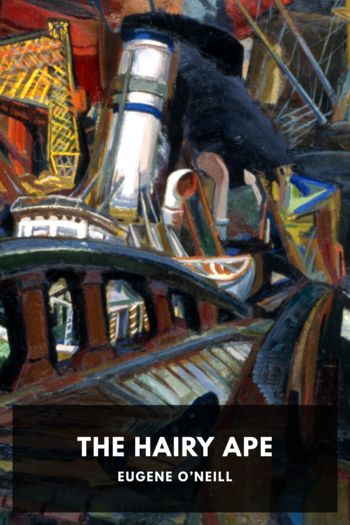The Atmospherians, Alex McElroy [best biographies to read .txt] 📗

- Author: Alex McElroy
Book online «The Atmospherians, Alex McElroy [best biographies to read .txt] 📗». Author Alex McElroy
Dyson wanted a father. Rather: fathers. An army of surrogate fathers to replace his own father, a man who wouldn’t apologize for the domestic sadism of mocking his son, a man who now could never apologize for that most callous decision: driving his truck into the median. I couldn’t decide, however, whether Dyson intended to forgive these fathers—and, in the process, learn to forgive his own—or if he wanted merely to punish them.
“Do you ever wish you could punish your father?” I asked him one night, during a movie.
“He already punished himself,” he said. He asked why I asked.
“I wish I could punish mine.” I didn’t realize I wanted this until I said it. But it seemed true to me, and I wondered how long I’d been hiding this from myself.
“Maybe that’s why we have fathers,” he said with a laugh. “To ensure everyone a person to punish.”
twenty-six
ON THE WEEKENDS I spent with my father, I swam. He was a limber, work-bludgeoned man with a brushy mustache who wore the same stained gray crewneck every day. He was not the type of man, I’m saying, to possess a pool, or to live in a complex home to a pool, or even the type to swim, as far as I knew. But he rewired foyers and installed chandeliers for people who did, the McMansioners spored across identically affluent New Jersey suburbs like Short Hills and Millburn and Creek.
I was nine the summer my parents split up. On my father’s weekends, he brought me along on his jobs to show me “the finest pools in the state.” He couldn’t offer me money or gifts, but he took pride in giving me access to rich people’s pools. All my favorite memories of him involve when we were driving to one of his jobs. Rarely did I see him happy, especially after the divorce—my mother’s decision—but in his truck he traded his grieving baritone for a goofy, carnival bark to describe the fantasy pools where I would swim: jungle pools with waterfalls frothing the rims, wintery pools lined with thick bricks of ice, lavender-scented water, high dives requiring parachutes, platinum lions jetting shimmering water into the shallow ends, pools built into natural caves, pools suspended midair, pools with no conceivable bottom, pools where dolphins arced out of the center like signatures.
Even the most luxurious pools could never live up to what he described. Perhaps I should have been angry at him for the expectations he put in my head, but I carried his fantasy versions with me as I swam, imagining dry ice water slides or beluga whales drifting beside me as I paddled through the bland rectangular pools of the conventionally minded elite. Over that summer, I swam in square pools, circular pools, octagonal pools, pools shaped in the profile of their owners, kidney-shaped pools, Olympic pools, wave pools, indoor pools with chalky lining that turned my toes blueberry blue, saltwater pools, exercise pools, endless pools, edgeless pools, and pools home to the chunkiest beetles I’ve ever seen in my life.
Never aboveground pools, however, which were too tacky for the neighborhoods where my father worked.
The homeowners encouraged my swimming. They cherished the tickle of generosity that came with allowing a blue-collar daughter to taste the fruits of their wealth. The mothers—and there were always mothers, hair-sprayed and made up, in floral summer dresses and sandals—treated me with condescending benevolence. They would rest flutes of Cherry 7UP on the ledge and beckoned me over to talk. They praised me for taking advantage of the pools their children neglected. They referred to their children as spoiled or bloated or unmotivated or dumb as the children looked down at us from their windows with teeth-gritted, envious scowls.
“Must be nice to join Daddy for work,” the mothers would say, and I’d mutter, “Uh-huh.” I never used the word daddy. Hearing it attached to my father made me shudder. Many asked what Mommy was doing. I never knew. Her weekends alone were fortresses; she rarely granted me access. These conversations exposed the canyons between the homeowners’ lives and my father’s, between his and mine. I hated pretending their assumptions about us were accurate—that my parents were married, that my mother’s life was mine to know. I fielded their questions as quickly as possible before paddling back to the deep end to hold my breath underwater.
Late that summer, my father took a job at a secluded stone mansion at the top of a hill. The husband, Mr. Hensey, opened the front door dressed in white slacks and a red Lacoste polo. Sunburn made flaky meat of his cheeks. He said something indecipherable, then dragged a spit-roped retainer out of his mouth. “I expected you earlier,” he said. We followed him in. The rest of the Hensey family was “out on the island,” but he stayed behind, he said with a laugh, to ensure my father didn’t “dickle around on the clock.”
My father laughed because Mr. Hensey laughed. I’d never wanted out of a conversation so badly. “My dad said I could go swimming,” I said.
Mr. Hensey blinked at me like I asked to take his car for a spin.
“She’s a water rat,” added my father.
“Of course,” Mr. Hensey finally said. “Let me roll off the tarp.”
The pool was bathwater warm and free of beetles and leaves. Sunlight cast prisms against the vinyl lining. A smooth cement walkway surrounded the pool. Hensey was painted in script on the side close to the house, and between the name and the house was a row of umbrella-shaded lounge chairs. What caught my attention, though, was the diving board hanging over the deep end, like a plank. Diving boards were rare in such lawsuit-averse communities. I flung off my towel and sprinted to the board, dived splashlessly through the surface, swam





Comments (0)